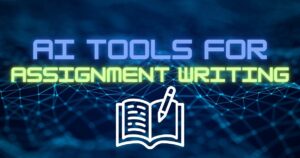Writing Literature Review with AI
Literature reviews are the bedrock of academic research, offering a comprehensive view of existing knowledge in a particular field.
The ability to harness the power of AI to assist in this crucial endeavor holds immense significance for scholars, saving time and effort while improving the quality and depth of their reviews.
The article is structured to walk you through the practical steps of using ChatGPT for literature reviews. We will start by understanding the fundamentals of literature reviews and tips and prompts for a more efficient research process.
Steps involved in writing a literature review
Traditional literature review writing often involves substantial time and effort, from searching for relevant papers and synthesizing information to ensuring proper citations. Literature review is conducted in following steps.
- Define your research question or topic
- Conduct a comprehensive literature search
- Review and select sources
- Summarize and categorize the literature
- Analyze and synthesize the literature
- Develop a structure for your literature review
- Write the literature review
- Revise and proofread
- Write a conclusion
- Citations and references
We will dive in how ChatGPT can helps us in each of these steps.
Step-by-Step Guide for Literature Review Writing with ChatGPT
Defining the Scope and Objectives
ChatGPT can help you clarify and refine your research question or objective by engaging in a conversation to discuss your topic. It can suggest specific subtopics, keywords, or concepts that might be relevant to your literature review.
Engaging in a Conversation: Begin a conversation with ChatGPT to discuss your research on climate change. This can help you narrow down the scope of your review.
“I’m conducting a literature review on climate change. Can we discuss potential research questions and objectives to make it more specific?”
Suggesting Specific Subtopics: Ask ChatGPT for suggestions on subtopics related to climate change that you can include in your literature review.
“What are some specific subtopics or aspects of climate change that are currently of interest? I want to make sure my literature review covers key areas.”
Exploring Emerging Concepts: Engage with ChatGPT to explore emerging concepts or trends in climate change research that could be included in your objectives.
“Can you highlight any emerging concepts or areas of study within climate change that I should consider incorporating into my literature review?”
Refining Research Objectives: Use ChatGPT to refine your research objectives by asking for clarification or more specific details.
“My initial objective is to study the impact of climate change on agriculture. How can I make this objective more specific and focused?”
Alternative Perspectives: Request ChatGPT’s input on alternative perspectives or viewpoints within climate change research to broaden your scope.
“Are there alternative perspectives on climate change, perhaps from economic, social, or political viewpoints, that I should incorporate into my literature review?”
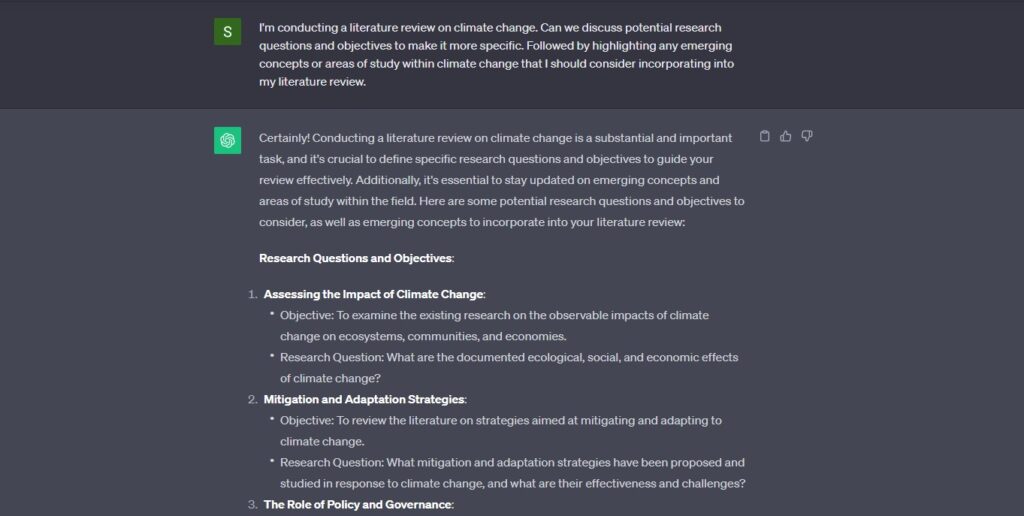
Searching for Relevant Literature
ChatGPT can assist in generating search queries, helping you identify databases, journals, or online platforms to find relevant literature. It can provide advice on how to effectively use Boolean operators and advanced search techniques to refine your search.
Generating Search Queries: ChatGPT can help you create effective search queries by suggesting keywords and phrases specific to your climate change research.
“Can you suggest some search queries I can use to find literature on the impacts of climate change on biodiversity?”
Identifying Suitable Databases and Journals: ChatGPT can recommend databases, academic journals, or online platforms that are known for hosting valuable climate change literature.
“Which databases or journals are the best sources for finding up-to-date research papers on climate change mitigation strategies?”
Searching for Specific Types of Literature: Ask ChatGPT to guide you on how to find particular types of literature, such as peer-reviewed articles, government reports, or international treaties related to climate change.
“I need to find international treaties on climate change. How can I narrow down my search to access relevant documents?”
“Do you know of any open-access resources that offer comprehensive studies on climate change adaptation in developing countries?”
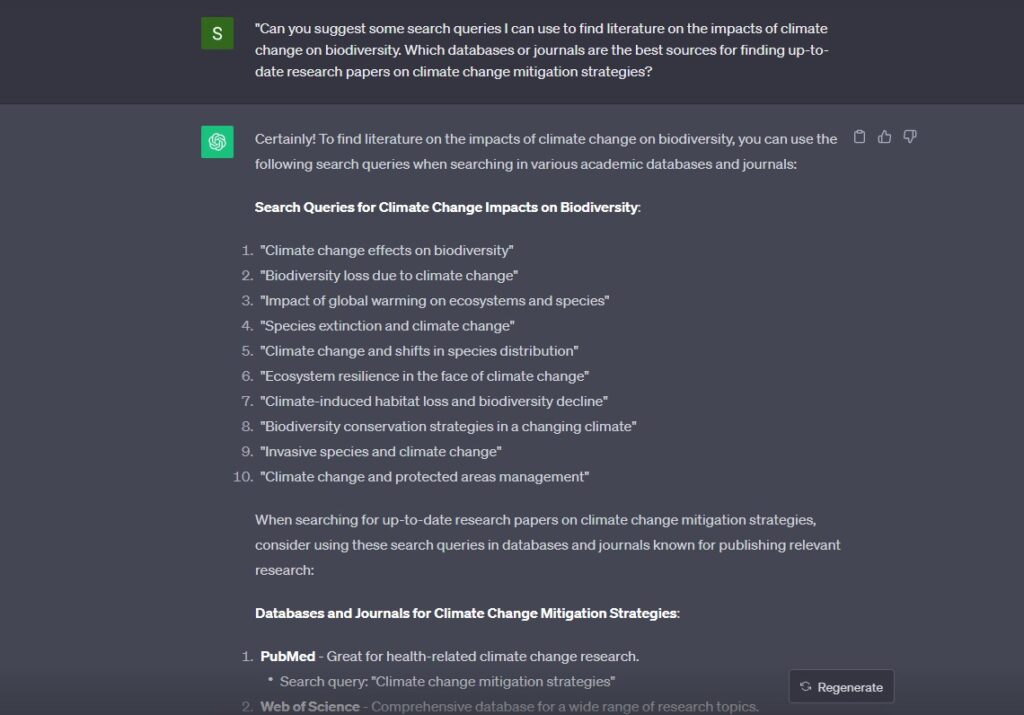
Selecting and Evaluating Sources
ChatGPT can guide you in evaluating the credibility of sources, such as how to check for peer-reviewed articles and reputable publishers. It can help you create a checklist or criteria for source evaluation and provide examples.
Evaluating Credibility of Sources: ChatGPT can provide a checklist of criteria for assessing source credibility, like peer-reviewed articles, reputable publishers, and authoritative authors.
“What are the key criteria I should consider to ensure the sources I find about climate change are credible and trustworthy?”
ChatGPT can explain how to identify peer-reviewed articles and distinguish them from other types of publications.
“Can you clarify the characteristics of a peer-reviewed article and how I can verify if a source related to climate change is indeed peer-reviewed?”
ChatGPT can help you establish criteria for assessing the expertise of authors in climate change research, considering their qualifications, affiliations, and contributions.
“What should I look for in an author’s background and credentials when evaluating sources for my climate change literature review?”
“What are the signs that indicate a source is authoritative in the field of climate change, and how can I find such sources?”
Cross-Referencing Multiple Sources: ChatGPT can emphasize the value of cross-referencing information across multiple sources to ensure accuracy and reliability.
“How can I cross-reference information from various sources to strengthen the credibility of my findings about climate change impacts on biodiversity?”
Organizing and Annotating Sources
ChatGPT can suggest tools and techniques for creating a database or list of sources, and help you create a template for annotating sources. It can assist in developing a structured approach for categorizing sources based on
Developing an Annotating Template: ChatGPT can guide you in creating a structured template for annotating your sources. This template might include fields for key findings, methodology, and relevance to your research.
“Can you help me design an annotating template for my climate change literature review, specifying the essential fields to include for each source?”
Categorizing Sources: ChatGPT can assist in developing a categorization strategy to sort your sources by themes, methodologies, or other relevant criteria.
“How can I categorize my climate change sources effectively, and what are some common criteria for organizing them into meaningful groups?”
Maintaining a Consistent Format: ChatGPT can advise on how to ensure that your annotations and source information are consistently formatted and organized.
“What are the best practices for maintaining a uniform format for annotations and source details in my climate change literature review?”
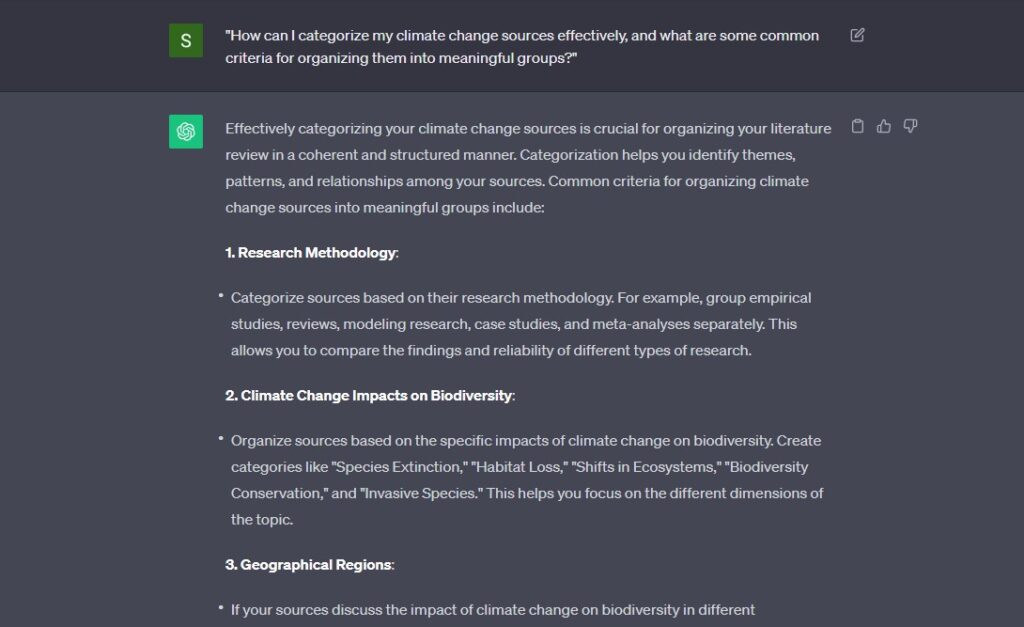
Identifying Trends and Patterns
ChatGPT can help you identify potential trends or patterns in the literature and suggest statistical or visualization tools to aid in analysis. It can guide you on how to create visual representations of your findings.
Identifying Trends and Patterns: ChatGPT can help you analyze your compiled data and identify recurring themes or trends within the climate change literature.
“What are the prevalent trends or recurring patterns in recent climate change research, and how can I identify them in the literature?”
Data Visualization Techniques: ChatGPT can introduce you to data visualization tools and techniques to create meaningful charts, graphs, or infographics.
“What are some effective data visualization techniques and tools to represent climate change research trends graphically, and how can I use them?”
Visual Representations of Findings: ChatGPT can guide you in creating visual representations of your findings, such as trend graphs or heatmaps.
“Can you help me create visual representations of the trends and patterns I’ve identified in my climate change literature review, and suggest tools for this purpose?”
Identifying Research Gaps: ChatGPT can help you identify gaps in the literature or areas where more research is needed based on your analysis.
“How can I use my trend analysis to pinpoint research gaps or areas where further studies are required in the context of climate change?”
Synthesizing and Summarizing
ChatGPT can assist in generating summaries of key findings from individual sources and offer suggestions on how to structure these summaries effectively. It can help you identify the most important aspects to include in your summaries.
Generating Summaries of Key Findings: ChatGPT can help you generate concise summaries of important findings from individual research papers, reports, or articles.
“Can you provide a summary of the key findings from this specific climate change research paper titled ‘Impacts of Climate Change on Coastal Ecosystems’?”
Structuring Effective Summaries: ChatGPT can offer suggestions on how to structure your summaries for clarity and coherence, such as organizing them by themes, methodologies, or chronological order.
“What’s an effective structure for summarizing the diverse findings related to climate change adaptation strategies in various regions? How should I organize my summaries?”
Identifying Critical Aspects: ChatGPT can guide you in identifying the most crucial aspects to include in your summaries, ensuring that you capture the essence of the research.
“What are the critical aspects I should focus on when summarizing the impact of climate change on biodiversity in my literature review?”
Highlighting Methodologies and Data: ChatGPT can assist in summarizing the methodologies and data used in the studies, enabling you to discuss research methods in your review.
“Please summarize the methodologies and data sources used in these climate change vulnerability assessments, and suggest how I can present them in my review.”
Comparing and Contrasting Findings: ChatGPT can help you summarize and compare findings from different sources, pointing out similarities, differences, or trends.
“Can you summarize the contrasting findings from two studies on the effects of climate change on crop yields and help me draw comparisons?”
Creating an Outline
ChatGPT can help you create a preliminary outline for your literature review, suggesting sections and subheadings. It can provide guidance on organizing your thoughts and ideas logically.
Preliminary Outline Suggestions: ChatGPT can provide you with a preliminary outline structure for your climate change literature review, suggesting sections, subheadings, and their order.
“Can you suggest a preliminary outline for my climate change literature review? I want to cover adaptation strategies, impacts on biodiversity, and policy initiatives.”
“I plan to discuss climate change effects on agriculture and human health. What sections and subheadings should I include in my outline for these topics?”
“How can I organize the information about climate change mitigation strategies under a subheading? What order would make the most sense?”
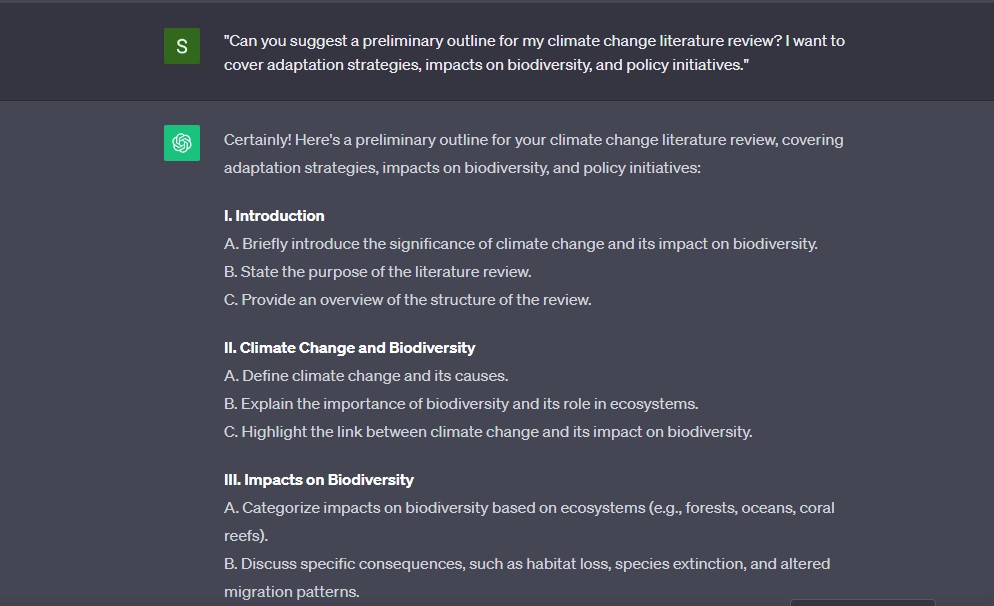
Balancing Content: ChatGPT can advise on balancing the content in your outline, helping you allocate the right amount of space to different sections based on their importance.
“How can I ensure a balanced outline for discussing both the causes and consequences of climate change in my review?”
“What are the key concepts in climate change research that I should include as subheadings in my outline?”
“My main research question is about assessing the effectiveness of climate change policies. How can I structure my outline to address this question effectively?”
Writing the Literature Review
ChatGPT can assist in drafting sections of your literature review by providing content suggestions, explanations, and examples. It can help you with writing introductory and concluding paragraphs, and with transitioning between different sections.
Drafting Content for Sections: ChatGPT can help you by providing content suggestions for various sections of your literature review. For instance, if you’re writing about the impact of climate change on biodiversity:
“Can you provide me with content for the ‘Impact of Climate Change on Biodiversity’ section? I’d like to include information on specific species affected and the reasons behind it.”
Content Explanations: If you encounter complex concepts or terminology, ChatGPT can explain them in simpler terms, ensuring your readers understand the content.
“I’m writing about climate feedback loops. Can you explain this concept and provide an example in the context of climate change?”
ChatGPT can suggest real-world examples and case studies related to climate change to reinforce your arguments.
“I want to illustrate the impact of climate change on extreme weather events. Could you provide some recent case studies or examples?”
Introductory and Concluding Paragraphs: ChatGPT can assist in crafting engaging and informative introductory and concluding paragraphs that provide context and summarize the key findings.
“Can you help me write an engaging introduction for my climate change literature review? I want to emphasize the urgency of addressing this issue.”
Structuring Arguments: ChatGPT can help structure your arguments and make your review coherent by suggesting the order of topics for maximum impact.
“I’m discussing the societal effects of climate change. How should I structure my arguments for the most persuasive impact?”
ChatGPT can suggest transitional phrases and sentences to ensure smooth connections.
“I need to transition from discussing mitigation strategies to the economic impact of climate change. Can you provide some transition ideas?”
Revising and Proofreading
ChatGPT can offer proofreading tips and common grammar and style checks to ensure your review is error-free. It can help you identify and correct inconsistencies and improve the overall quality of your writing.
Grammar and Style Checks: ChatGPT can identify and correct common grammar and style issues. It can highlight instances of passive voice, wordiness, or tense inconsistencies.
“Can you review my literature review for any instances of passive voice related to climate change impacts, and suggest how to make them more active?”
Inconsistency Checks
“I’ve used ‘global warming’ and ‘climate change’ interchangeably. Can you help me ensure consistency in my use of these terms in my literature review?”
Improving Clarity:
“My literature review has some convoluted sentences about climate models. Can you help me simplify them for better clarity?”
Citation and Referencing Checks: ChatGPT can verify that your citations and references follow the appropriate style guide (e.g., APA, MLA) and provide guidance on citing specific climate change data sources.
“I’m unsure if my APA citations for climate change reports are accurate. Can you review them and suggest corrections?”
Seeking Feedback
ChatGPT can provide advice on how to effectively share your literature review with others for feedback, and on how to interpret and incorporate that feedback.
Interpreting Feedback: ChatGPT can help you understand and interpret the feedback you receive. It can guide you on differentiating between constructive and less relevant feedback.
“I received diverse feedback on my climate change literature review. How can I differentiate between feedback that truly enhances my work and feedback that may not be as relevant?”
“I’ve received feedback on my climate change literature review. How can I systematically apply this feedback to improve my work?”
“Some feedback on my climate change literature review conflicts with my own perspective. How can I address these differing opinions while maintaining the integrity of my work?”
Read This

9 AI tools for writing emails (Free & Paid) To Be More Productive
Ai tools for writing emails Writing and replying to email can be a real hassle and to be honest one of the…
Read This

7 Top Tier AI Tools to Write Literature Review (Free & Paid)
AI Tools to Write Literature Review AI can be a valuable tool for assisting researchers in the process of literature review writing,…
Ethical Considerations For Using ChatGPT for Literature Review
AI tools like ChatGPT can be incredibly helpful, but they also come with ethical considerations. Researchers must ensure that the use of AI-generated content aligns with ethical standards. This involves:
- Authorship and Attribution: Clearly attribute AI-generated content to the tool used e.g., Generated with ChatGPT. Avoid presenting AI-generated content as if it were written by a human author.
- Plagiarism and Originality: Ensure that AI-generated content does not inadvertently lead to plagiarism. Verify the originality of the generated text and cite any sources or inspirations appropriately.
- Privacy and Data Security: Respect privacy concerns related to data used with AI tools. Protect sensitive information and follow data protection regulations when collecting or using data.
Best Practices for Using ChatGPT for Literature Review
Human researchers play a central role in the literature review process. AI can assist by accelerating content creation, but it can’t replace the depth of human expertise.
Researchers should leverage AI-generated content as a tool for enhancing their work, not as a substitute for their insights and judgment. Collaborative approaches, where humans work in tandem with AI, offer the best of both worlds.
You can Fine-Tune your ChatGPT experience by keeping following in mind.
- Edit and Refine: Review AI-generated content for clarity, accuracy, and relevance. Edit and rephrase text to align with the overall review’s tone and style.
- Provide Context: Add contextual information or expert insights that AI may not capture.
- Create a Well-Structured Prompt: Craft a detailed and specific prompt for ChatGPT. Clearly communicate the topic, subtopics, and context of your literature review. The more context you give it the better the output. So don’t hesitate and play while formulating your prompts.
- Fine-Tuning: If you are using ChatGPT – 4, then you can fine-tune the AI model. This involves training the model on specific datasets to align it with your research area, improving the quality of generated content.
- Review and Feedback: Regularly review the output and provide feedback to the AI model. This iterative process can help improve the accuracy and relevance of generated content over time.
- Interact with ChatGPT: Engage in a conversational dialogue with ChatGPT. Start with broad questions to gather initial insights and gradually delve into specific areas of interest. Be prepared to ask follow-up questions for deeper analysis.
Related: Best AI Tools For Writing Literature Review


